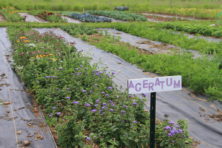Victory Gardens: Penne Wilson revives the food-growing efforts of WWI and WWII
- Share
- Tweet
- Pin
- Share
At first glance, Penne Wilson may seem like an unlikely general in the battle against COVID-19. She’s not a health-care provider or grocery store employee or emergency responder. Yet, as she watched the COVID-19 outbreak take hold in our country, she came up with a powerful way to help.
“We’ve got this little army of volunteers,” she said.
And what Wilson’s army is doing is growing vegetable seedlings for the Victory Gardens Initiative – a project of the Door County Seed Library – so that residents can more easily grow their own food.
The concept of victory gardens, or war gardens, originated during World War I. Citizens contributed to the war effort by growing their own food, which eased pressure on the national food supply and meant that more of the nation’s provisions could be sent to American allies overseas. Victory gardens made a comeback during the food-rationing era of World War II. Although fighting COVID-19 is a different kind of war, Wilson thinks that helping people grow their own food still is a smart strategy.
“This seemed like a great opportunity to step up and say, ‘Let’s spread some good,’ and give people something that they could do to feel like they’re making a difference,” she said.
Wilson, a Sturgeon Bay resident, helped to launch the Door County Seed Library, which provides free seeds for people to grow on their own. The first seed library opened in March 2019 within the Door County Library’s Sturgeon Bay branch. This spring Wilson and her team had planned to open seed libraries at six more library branches in the county. Then came COVID-19.
“Now more than ever, we need to get seeds in the hands of people,” Wilson emphasized. “Whatever we can do to help people grow some food and share some food is what we need to do.” And thus, the Victory Gardens Initiative was born.
Wilson and her team gathered all of the seeds that were originally intended for the libraries, created bundles with 15 seed packets each, and offered them, free of charge, to seed-library members to grow on their own. During a one-week period, Wilson said 133 bundles were picked up.
Next, she asked for volunteers to grow seedlings to donate to the program. So far, 12 to 15 people have agreed to help, and Flying Tractor Farm and Emerald Acres Farm are also growing seedlings to donate.
Emerald Acres owners Valerie and David Boyarski said they’re growing tomato and pepper seedlings, lettuce and more, and they’ll donate as many plants as they can. The Boyarskis said that for them, farming is primarily a way to connect to the community, so being a part of the Victory Gardens Initiative is a perfect fit.
“It’s a way to contribute to the community and offer things that may not be readily available right now,” Valerie said.
Wilson and her team of volunteers will figure out how to safely get the seedlings into gardeners’ hands once they’re ready.
Putting plants in the ground is just one part of the Victory Gardens Initiative. Wilson said the group would like to partner with teachers who want to grow plants and use the initiative as part of a broader educational lesson. And to bring the project full circle, those involved in the initiative encourage people who plant victory gardens to save seeds to return to the seed library to be given to others.
“My hope is that the Door County Seed Library can play a small part in helping to build a stronger and more resilient Door County by establishing community connections,” Wilson said.
Judging by the response so far, it’s working. Wilson and her team have distributed all 235 of their victory garden seed bundles, and almost 170 new members have joined the Door County Seed Library. Becoming a member is free. Just sign up at doorcountyseedlibrary.org. Find more information about the Victory Gardens Initiative and growing tips on the Door County Seed Library’s Facebook page.

